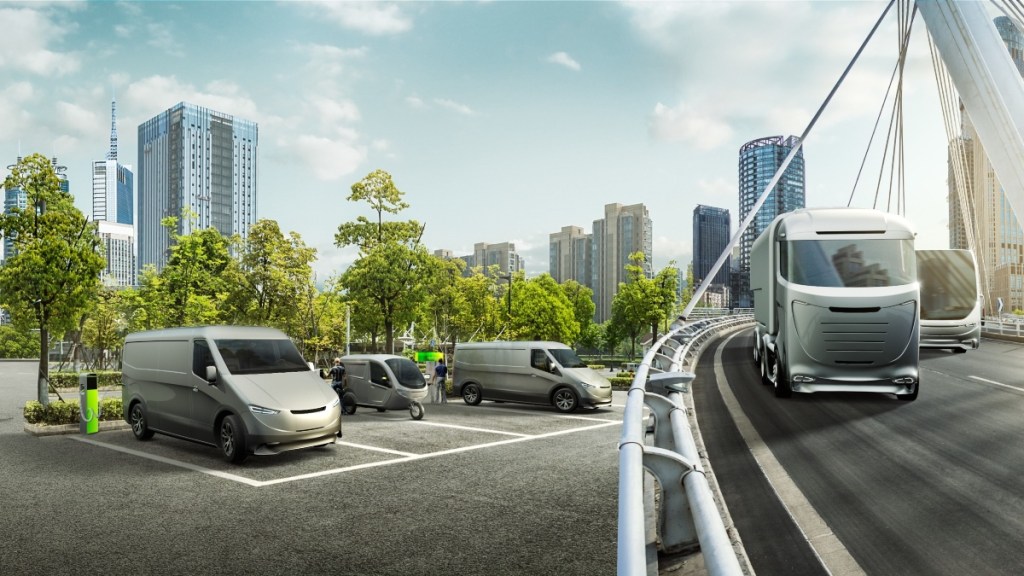Bosch Mobility forecasts that nearly 20 percent of all newly registered commercial vehicles, heavier than six metric tonnes, will have a battery-electric powertrain in 2030, while fuel cells will have a share of around 3 percent. According to the projections at the IAA Transportation, by 2035, one in three trucks will have a battery on board, and one in ten will feature a fuel cell. At this point, the hydrogen engine will also be on the road, albeit in smaller numbers. However, they cautioned that for freight transport to go electric, proper infrastructure needs to be in place.
Global vehicle production is projected to remain flat in this year compared to the previous year. However, assuming a strong final quarter, Bosch Mobility expects modest sales growth in 2024 despite the tough market conditions. The company aims to reach over 80 billion euros in global sales by 2029 and is said to be at the forefront of the green transformation of freight transport by expanding its diverse portfolio of alternative powertrains for commercial vehicles.
Markus Heyn, member of the Bosch board of management and chairman of the Mobility business sector, at this year’s IAA Transportation trade fair in Hannover said, “In the coming years, we expect the continuing growth in global freight transport and the simultaneous switch to alternative powertrains for commercial vehicles to drive another surge in growth for our business. For us, our business with big vehicles is anything but a small matter – in Mobility, we generate one-quarter of our sales with trucks and vans.”
Heyn further added, “We need a consistent and faster expansion of electric charging stations and hydrogen filling stations in Germany and Europe,” for extensive adoption.
Bosch’s new commercial business setup
The company intends to reorganize its commercial-vehicle business within the mobility sector in response to growth in global freight transport and the shift to alternative powertrains. Starting January 2025, under the leadership of Jan- Oliver Röhrl, executive vice president for commercial vehicles and off-road, the company will create a new business unit to merge essential competencies, bringing system development with product and portfolio management for trucks and off-highway applications.
Röhrl at IAA Transportation 2024 said, “We’re convinced that this new setup will offer benefits to our customers – and that we will collaborate with even greater success as a result. Together, we want to get commercial vehicles on the road even more efficiently and safely.”
The various powertrain technologies allow manufacturers to decide on the optimum solution for each application; the company is not only further developing powertrain technologies for batteries, fuel cells, and hydrogen engines, but is also making efficient modern combustion engines. Given the size of the existing vehicle fleet, synthetic fuels could significantly contribute to mitigating climate change.
Trucks and vans must also be updatable
The automotive industry’s shift towards software-defined mobility is also transforming commercial vehicles, making it essential for trucks and vans to be upgradable like passenger cars. The goal is to simplify vehicle electrical architectures by reducing the number of computers from many to just a few. The company is aiding manufacturers in this transition by providing a range of software solutions and services. Their digital service platform, L. OS, addresses specific challenges in transportation and logistics through a marketplace that integrates various digital solutions, covering areas like fleet management and route planning. Bosch’s connectivity solutions enable fleet operators to optimize vehicle use and minimize downtimes, with the help of a retrofittable control unit that accesses operational and diagnostic data. Features like the Retrofit Efficiency module can reduce fuel consumption by up to 4%, while the Vehicle Health service helps identify potential issues early, facilitating better maintenance planning and reducing unexpected breakdowns.
Assistance systems for commercial vehicles are progressing quickly
At IAA Transportation, Bosch showcases its innovations in modern freight transport, with technologies already impacting goods movement globally. In China, Bosch has begun mass production of an e-axle for heavy commercial vehicles, suitable for both battery-electric and fuel-cell vehicles. In India, the company supplies essential components for hydrogen engines, while in the U.S., Bosch is collaborating on a cryogenic pump to facilitate faster hydrogen refueling for commercial vehicles. Additionally, Bosch’s assistance systems play a vital role in enhancing safety and efficiency; for instance, lane-keeping support can prevent one in eight heavy truck accidents, and the electronic horizon system optimizes fuel consumption by adjusting vehicle speed based on environmental data, potentially reducing CO2 emissions by up to 5%. Over one million vehicles are already equipped with this system.


















